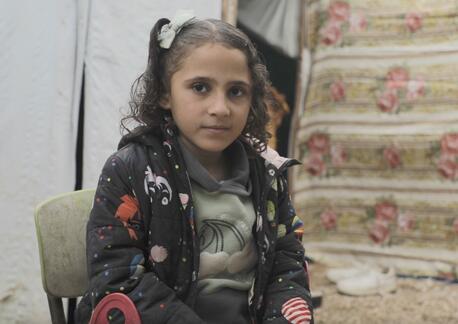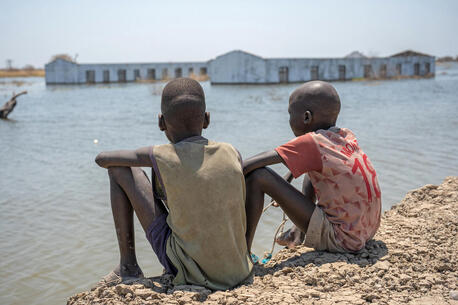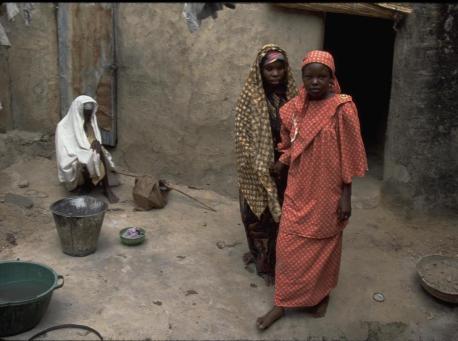
With UPS's Help, UNICEF USA Delivers!
When there's no time to spare, UNICEF and UPS team up to get emergency supplies where they're needed most, in record time.
When Hurricane Maria slammed into Puerto Rico in September, the Category 5 storm left 3.4 million people in desperate need of clean water, food, electricity, fuel and medicines. How to get supplies to those in need, fast?
The answer: UNICEF USA plus UPS.
In the wake of Hurricane Maria, UPS and UNICEF USA are delivering emergency supplies to Puerto Rico
Working with New York Governor Andrew Cuomo's Empire State Relief and Recovery Effort for Puerto Rico, local community groups and Puerto Rico's Center for a New Economy, UNICEF USA and UPS rushed safe drinking water and an emergency shipment of 12,000 hygiene kits to families struggling to survive. Each kit contained a 30-day supply of basic hygiene necessities — including a water bucket with a lid, soap, water purification tablets, a clothesline and clothes pins — to sustain a family of five.
Three months later, running water, electrical power, and basic goods are still in short supply; daily life remains an ordeal for many. UNICEF USA and UPS are still hard at work delivering badly needed supplies to the people of Puerto Rico who are hurting the most.
Last week, UNICEF USA and UPS delivered a shipment of diapers, wipes, feminine sanitary pads and other necessities to the small town of Loiza on Puerto Rico's northeastern coast, where more than half the population lives below the poverty line. Carla Alonso, logistics coordinator for Center for a New Economy and Espacios Abiertos, and others have set up a network of distribution centers and implemented tracking mechanisms to ensure that products are distributed equitably and to the people who need them most. Community groups have also organized special door-to-door deliveries to bring supplies to the sick and bedridden.
After Hurricane Maria left much of Puerto Rico without access to safe water, UNICEF and UPS rushed a shipment of 12,000 emergency kits to provide 60,000 vulnerable children and families with basic hygiene necessities for 30 days.
"UPS operates in 220 countries and territories, so when a community suffers, chances are our people are hurting too," says Eduardo Martinez, president of the UPS Foundation and UPS chief diversity & inclusion officer. "We've had a long history of being there to help communities in need, because these are our communities, too — our customers are hurting in those communities. When a crisis occurs, chances are that the supply chain is either broken or ineffective. That's where we can engage people, using our philanthropy and the resources of the company to build back those supply chains and save lives."
/>
In a season of terrible storms, Hurricane Maria was among the worst ever. UNICEF USA and UPS partnered with New York Governor Andrew Cuomo's Empire State Relief and Recovery Effort for Puerto Rico and local community organizations to deliver emergency supplies.
"Logistics plays a vital role whenever a humanitarian crisis occurs, which is why UPS has lent its expertise for many years to bringing critical logistical support to areas of the world affected by disease, drought and other disasters," according to former UPS International President Dan Brutto, a member of the board of directors of UNICEF USA.
Since 2000, UPS has partnered with UNICEF to deliver lifesaving supplies to hard-to-reach places around the world
Since 2000, UPS has partnered with UNICEF to deliver lifesaving supplies to hard-to-reach places. To date, UPS has provided over $9 million in grant funding, logistics expertise and in-kind support, including donated flights (either by providing UPS "brown tail" planes or supporting charter flights) and ground transport to UNICEF USA and UNICEF.
Last spring, as drought and armed conflict pushed northeast Nigeria, Somalia, South Sudan and Yemen closer to the brink of famine, the need for immediate assistance was clear. Sharing their decades of logistical expertise, UPS and UNICEF hastily arranged a massive shipment to Somalia: 9.5 metric tons of vaccines, safe water and sanitation equipment airlifted in on charter planes; 20 ocean containers filled with 360 metric tons of Ready-to-Use Therapeutic Food and 22 ocean containers holding 460 metric tons of mosquito nets to protect agaist malaria (one metric ton, for the record, is 2,204 pounds. That's a lot of mosquito nets!)
UPS and UNICEF delivered education kits to Houston to help get students back to learning
At the end of the summer, Hurricane Harvey damaged at least 200 schools in the Houston Independent School District — the largest public school system in Texas and the seventh-largest in the United States — forcing school closures and disrupting the lives of hundreds of thousands of students and teachers. To help students get back to learning, UPS provided logistical support and volunteersto help UNICEF USA deliver education kits to over 400 classrooms throughout the system.
UNICEF USA partnered with UPS to prepare and deliver education kits to over 400 classrooms after Hurricane Harvey damaged at least 200 schools in the Houston Independent School District.
"I'm here to help put together these kits for children of Houston who've been displaced from their classrooms," Gabriella Morris, UNICEF USA senior vice president of strategic partnerships said in October. "I happen to be from Houston, so I'm doubly excited that I could do something with UNICEF USA for my hometown."
Sharing their decades of logistical expertise, UNICEF and UPS get supplies where they are needed, fast
Following Haiti's devastating 2010 earthquake, UPS mobilized the company's global network of staff, warehouses, and shipping and freight services to help UNICEF assemble and ship 50,000 child protection kits to Haiti. The kits, containing urgently needed basic items such as shorts and shoes, were distributed by UNICEF to unaccompanied children awaiting reunification with surviving parents or other relatives.
In 2013 and 2014, UPS provided expertise, volunteer assistance and freight services to send nearly 44,000 winter clothing kits to refugee children in Lebanon and northern Iraq. In 2014, UPS provided logistic support and shipping of emergency supplies for the Syrian crisis, Ebola crisis, floods in the Solomon Islands and South Sudan crisis. In 2015, UPS delivered support to both Nepal and Yemen.

UPS and UNICEF are working together to deliver badly needed educational and health supplies to Rohingya refugees fleeing brutality in Myanmar. Above, refugees carry boxes near the sprawling Kutupalong refugee camp in Ukhia, Cox's Bazar, Bangladesh. © UNICEF/UN0141036/LeMoyne
UPS's support for UNICEF's Visibility for Vaccines project has helped governments visualize stock level projections
Also in 2015, UPS supported UNICEF's Visibility for Vaccines (ViVa) project, an advocacy tool for program governments to visualize vaccine stock level projections and to alert them about critical stock outs and overstocking situations. In 2016, ViVa was presented to 15 Ministry of Health and UNICEF staff at the East Africa Regional Immunization Supply Chain Management Workshop as part of larger Gavi and UNICEF supply chain strengthening strategies. The ViVa project has since expanded by scaling up and rolling out the web-based ViVa tool to more than 21 countries.
In 2016, UPS donated $1 million in transport for emergency supplies to Ecuador, South Sudan, Nigeria and Haiti. Just since July 2017, UPS Foundation has donated more than $700,000 in relief flights and logistical support, including support for the famine relief efforts in Somalia and providing educational and health supplies to Rohingya refugees fleeing to Bangladesh.
The UPS / UNICEF partnership has evolved over the past decade into a truly integrated collaboration
In addition to providing emergency response support, UPS has provided grant funding to UNICEF Supply Division for activities in transportation management, optimization of warehouse replenishment planning, nutrition supply chain management and barcoding. The UPS / UNICEF partnership has evolved over the past decade into a truly integrated collaboration encompassing grant investments, in-kind contributions, expertise-sharing, employee volunteerism and leadership engagement.
"We're honored to work side-by-side with UNICEF and a number of other United Nations agencies," says UPS's Martinez. "It's just an honor to do this kind of work."
Top photo: Student and teacher volunteers unload essential supplies from a UPS truck outside a state-run elementary school in Toa Baja, Puerto Rico. The school is part of the Instituto Nueva Escuela, a network of Montesorri-based schools that have been serving as emergency distribution centers since Hurricane Maria ravaged the island. Helping unload are UNICEF USA's Edison Sabala (center) and Michelle Centeno (in black T-shirt), INE Assistant Director Inamaris Carreras Negron (in green shirt) and UPS driver Miguel Cambrelen (right).
HOW TO HELP
There are many ways to make a difference
War, famine, poverty, natural disasters — threats to the world's children keep coming. But UNICEF won't stop working to keep children healthy and safe.
UNICEF works in over 190 countries and territories — more places than any other children's organization. UNICEF has the world's largest humanitarian warehouse and, when disaster strikes, can get supplies almost anywhere within 72 hours. Constantly innovating, always advocating for a better world for children, UNICEF works to ensure that every child can grow up healthy, educated, protected and respected.
Would you like to help give all children the opportunity to reach their full potential? There are many ways to get involved.





